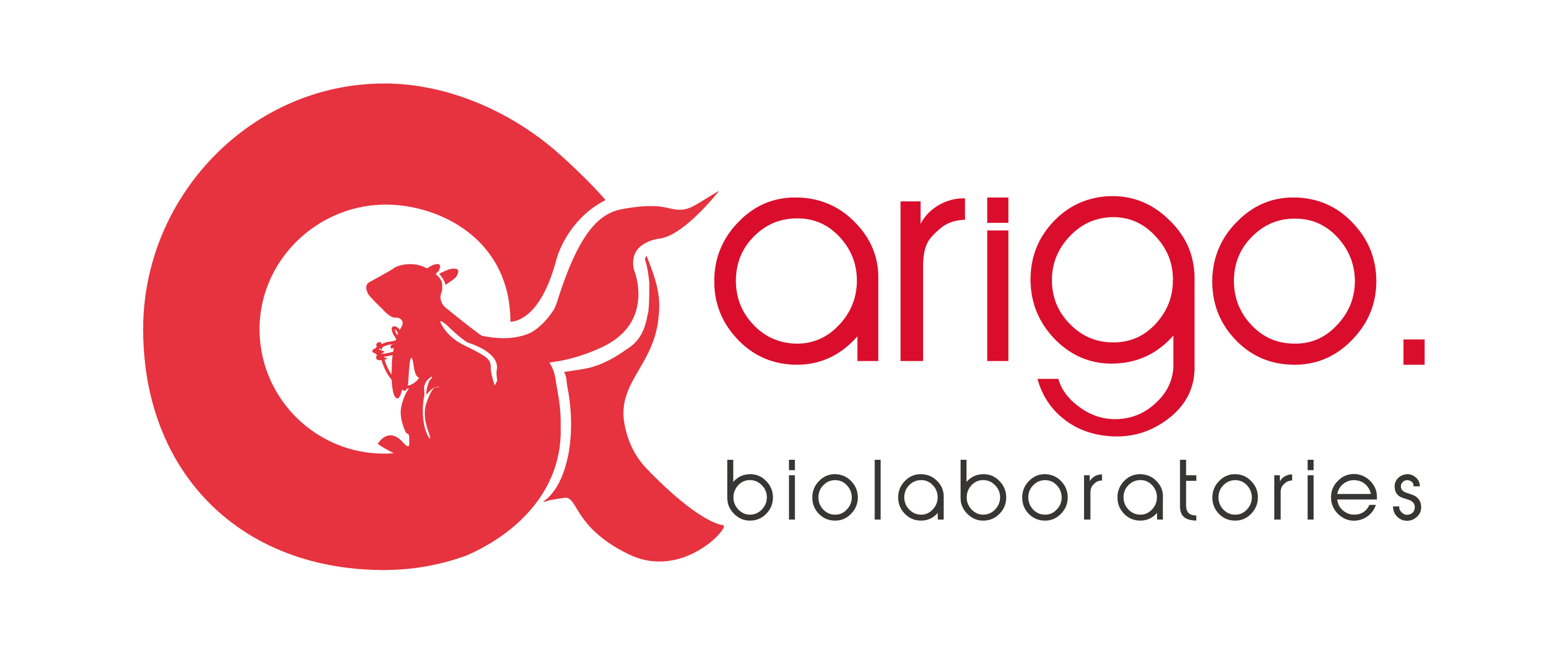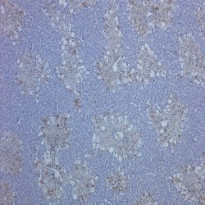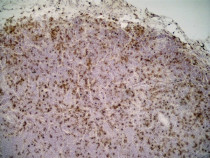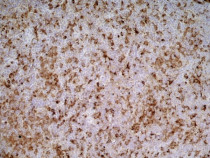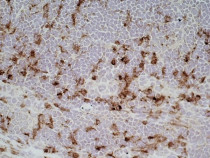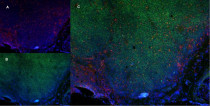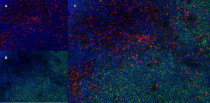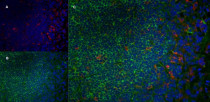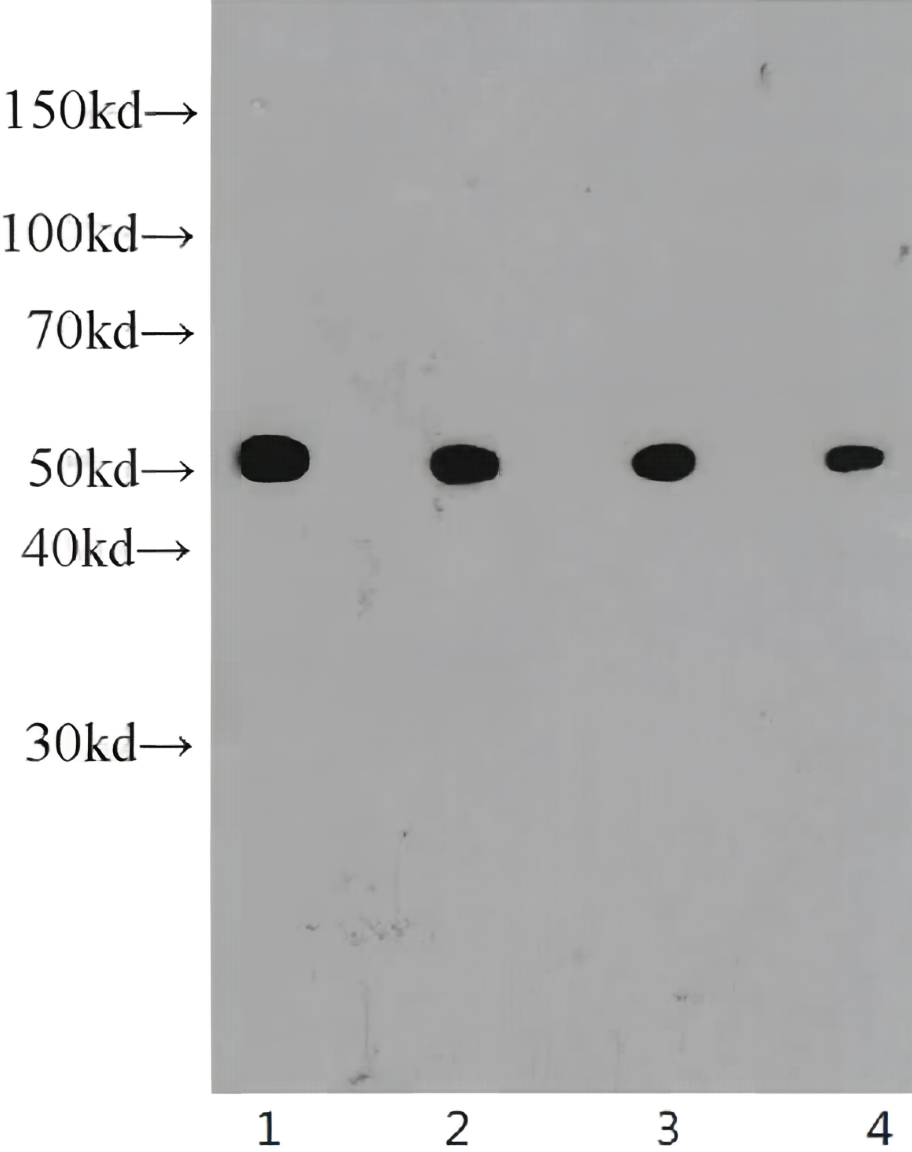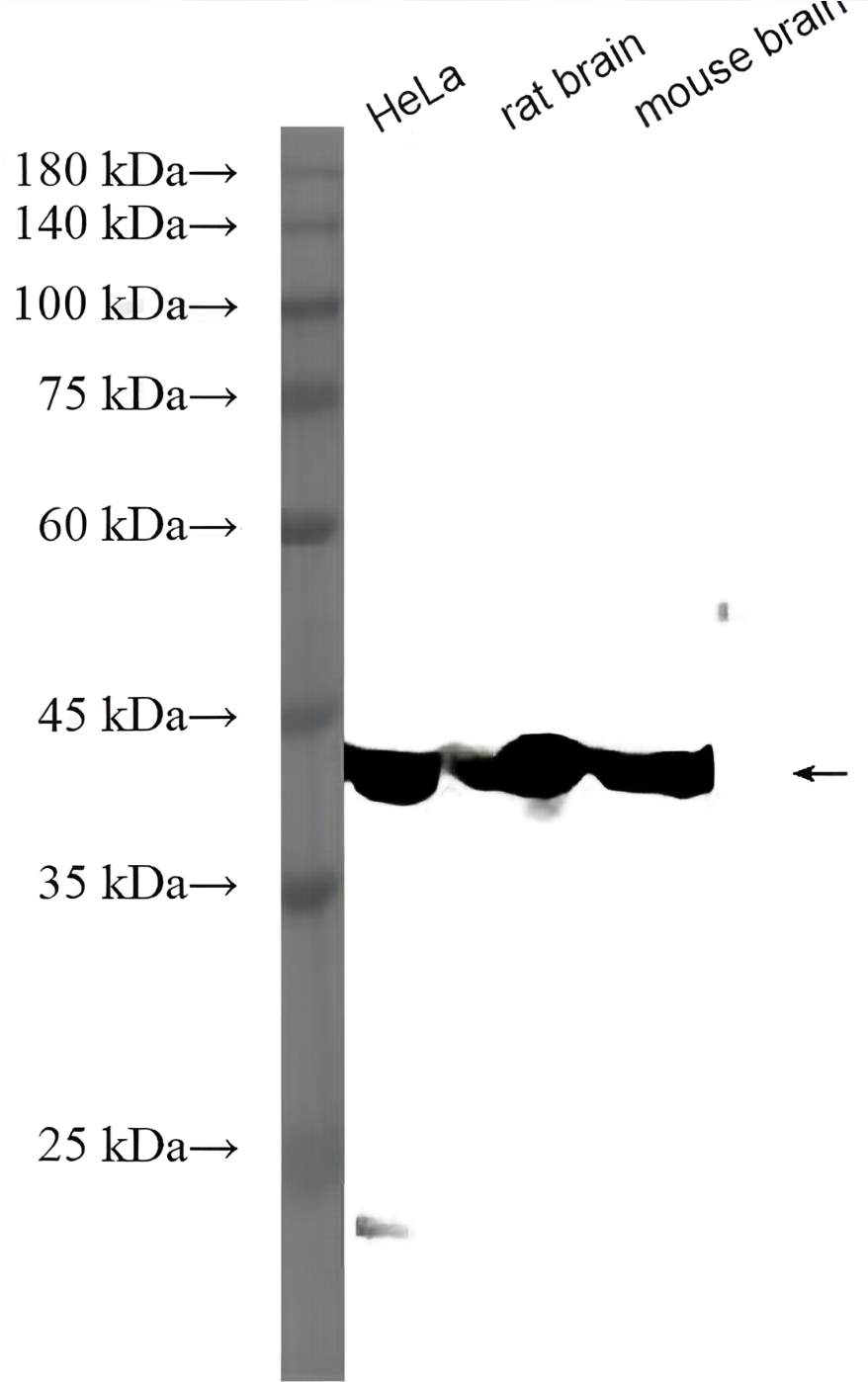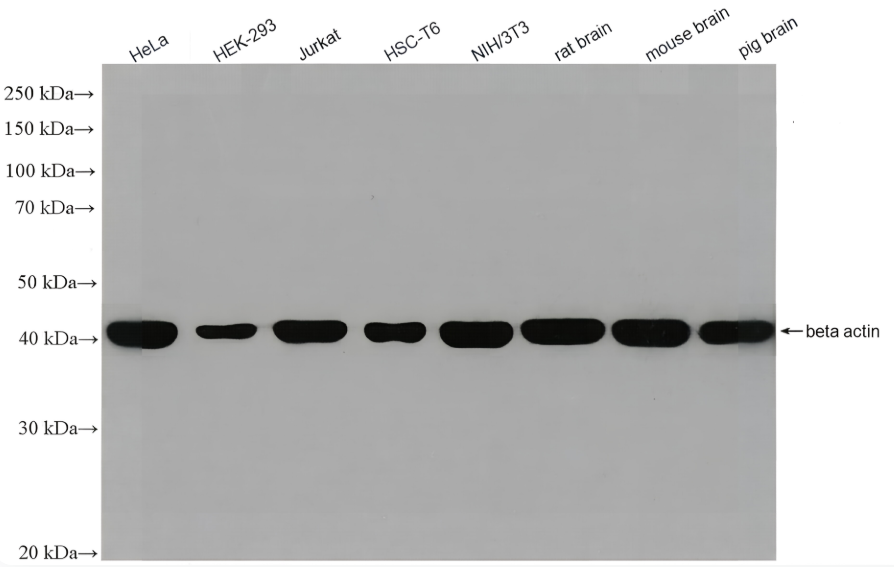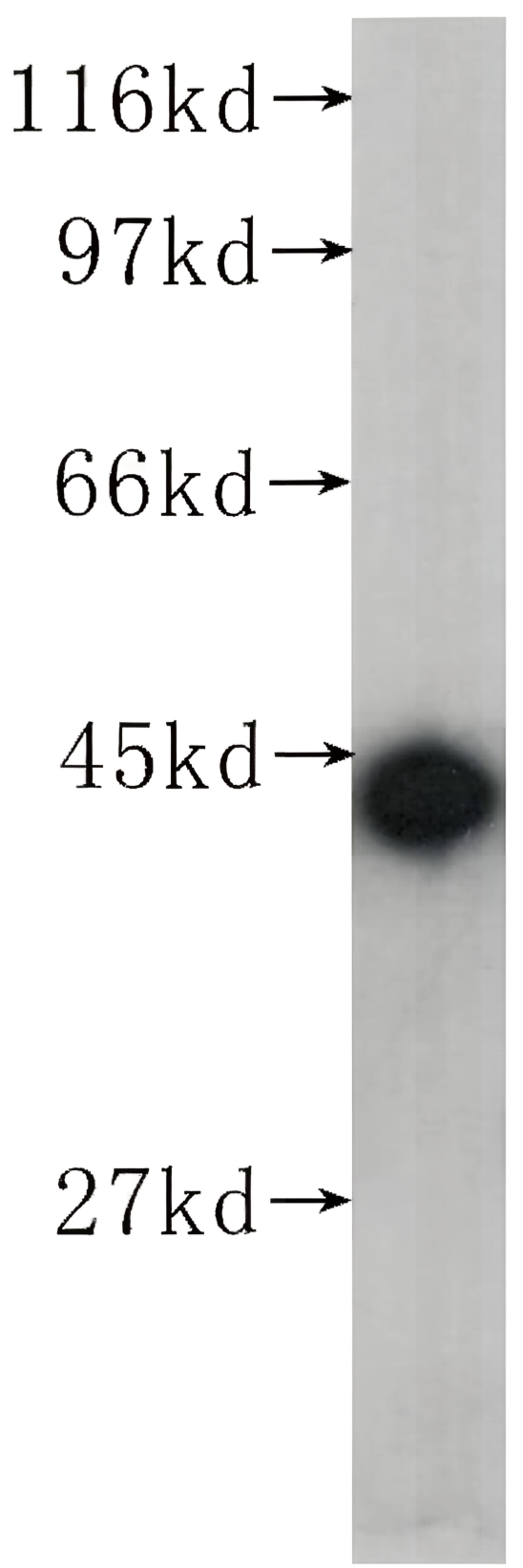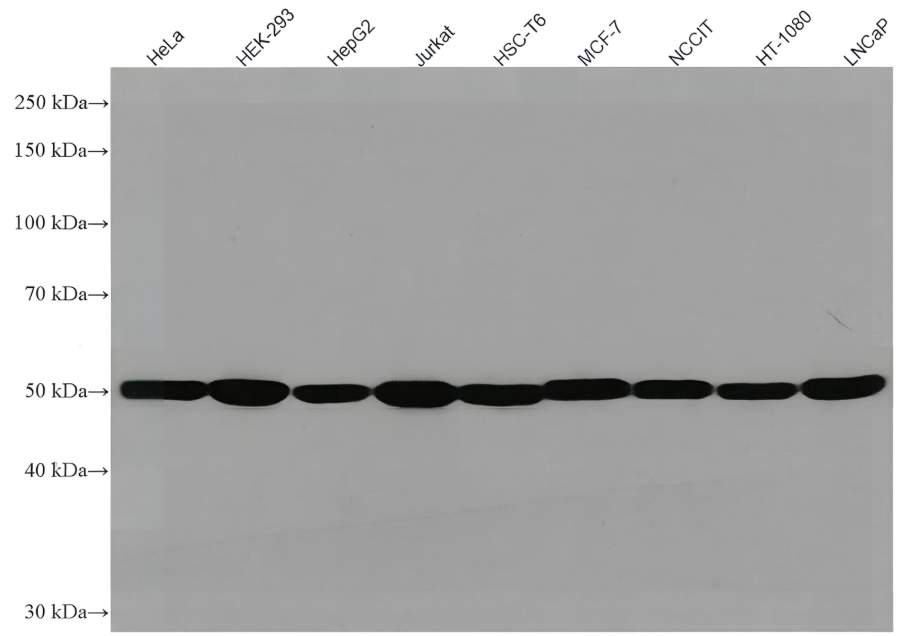anti-CD68 antibody [ED1]
| 产品描述 | Mouse Monoclonal antibody [ED1] recognizes CD68 Mouse anti rat CD68, clone ED1 recognizes the rat ED1 antigen. The ED1 antigen is expressed on most macrophages populations, as well as on monocytes and is considered as a pan-macrophage marker in the rat. |
|---|---|
| 反应物种 | Ms, Rat, Bov |
| 不反应物种 | Hrs |
| 应用 | FACS, IHC-Fr, IHC-P, IP, WB |
| 宿主 | Mouse |
| 克隆 | Monoclonal |
| 克隆号 | ED1 |
| 同位型 | IgG1 |
| 靶点名称 | CD68 |
| 抗原物种 | Rat |
| 抗原 | Rat spleen cells |
| 偶联标记 | Un-conjugated |
| 別名 | Macrosialin; CD antigen CD68; LAMP4; Gp110; GP110; SCARD1 |
| 应用建议 |
| ||||||||||||
|---|---|---|---|---|---|---|---|---|---|---|---|---|---|
| 应用说明 | FACS: Membrane permeabilisation is required for this application. Use 10 µl of the suggested working dilution to label 10^6 cells in 100 µl. IHC-P: This product requires protein digestion pre-treatment of paraffin sections e.g. trypsin or pronase. * The dilutions indicate recommended starting dilutions and the optimal dilutions or concentrations should be determined by the scientist. |
| 形式 | Liquid |
|---|---|
| 纯化 | Purification with Protein A. |
| 缓冲液 | PBS and 0.09% Sodium azide. |
| 抗菌剂 | 0.09% Sodium azide |
| 浓度 | 1 mg/ml |
| 存放说明 | For continuous use, store undiluted antibody at 2-8°C for up to a week. For long-term storage, aliquot and store at -20°C or below. Storage in frost free freezers is not recommended. Avoid repeated freeze/thaw cycles. Suggest spin the vial prior to opening. The antibody solution should be gently mixed before use. |
| 注意事项 | For laboratory research only, not for drug, diagnostic or other use. |
| 数据库连接 | |
|---|---|
| 基因名称 | CD68 |
| 全名 | CD68 molecule |
| 背景介绍 | CD68 is a 110-kD transmembrane glycoprotein that is highly expressed by human monocytes and tissue macrophages. It is a member of the lysosomal/endosomal-associated membrane glycoprotein (LAMP) family. The protein primarily localizes to lysosomes and endosomes with a smaller fraction circulating to the cell surface. It is a type I integral membrane protein with a heavily glycosylated extracellular domain and binds to tissue- and organ-specific lectins or selectins. The protein is also a member of the scavenger receptor family. Scavenger receptors typically function to clear cellular debris, promote phagocytosis, and mediate the recruitment and activation of macrophages. Alternative splicing results in multiple transcripts encoding different isoforms. [provided by RefSeq, Jul 2008] |
| 生物功能 | CD68 could play a role in phagocytic activities of tissue macrophages, both in intracellular lysosomal metabolism and extracellular cell-cell and cell-pathogen interactions. Binds to tissue- and organ-specific lectins or selectins, allowing homing of macrophage subsets to particular sites. Rapid recirculation of CD68 from endosomes and lysosomes to the plasma membrane may allow macrophages to crawl over selectin-bearing substrates or other cells. [UniProt] |
| 产品亮点 | Related products: CD68 antibodies; CD68 Duos / Panels; Anti-Mouse IgG secondary antibodies; Related news: New antibody panels and duos for Tumor immune microenvironment Tumor-Infiltrating Lymphocytes (TILs) Exploring Antiviral Immune Response Anti-SerpinB9 therapy, a new strategy for cancer therapy RIP1 activation and pathogenesis of NASH |
| 研究领域 | Immune System antibody; Activated Macrophage/Microglia Study antibody; Neuroinflammation Study antibody; Active macroglial Marker antibody; M1/M2/TAM Marker antibody; Macrophage Marker antibody; M1 macrophage Marker antibody; Inflammatory Cell Marker antibody |
| 预测分子量 | 37 kDa |
| 翻译后修饰 | N- and O-glycosylated. [UniProt] |
ARG23387 anti-CD68 antibody [ED1] WB image
Western blot: 20 µg of Rat spleen lysate stained with ARG23387 anti-CD68 antibody [ED1] at 1:500 dilution.
ARG23387 anti-CD68 antibody [ED1] IHC image
Immunohistochemistry: Rat liver, with induced hepatocellular damage, stained with ARG23387 anti-CD68 antibody [ED1].
ARG23387 anti-CD68 antibody [ED1] IHC-Fr image
Immunohistochemistry: Rat lymph node cryosection stained with ARG23387 anti-CD68 antibody [ED1] followed by HRP-conjugated Goat anti Mouse IgG1 as a detection reagent. (Low power).
ARG23387 anti-CD68 antibody [ED1] IHC-Fr image
Immunohistochemistry: Rat lymph node cryosection stained with ARG23387 anti-CD68 antibody [ED1] followed by HRP-conjugated Goat anti Mouse IgG1 as a detection reagent. (Medium power).
ARG23387 anti-CD68 antibody [ED1] IHC-Fr image
Immunohistochemistry: Rat lymph node cryosection stained with ARG23387 anti-CD68 antibody [ED1] followed by HRP-conjugated Goat anti Mouse IgG1 as a detection reagent. (High power).
ARG23387 anti-CD68 antibody [ED1] IHC-Fr image
Immunohistochemistry: Rat lymph node cryosection stained with ARG23387 anti-CD68 antibody [ED1], red in A and Mouse anti Rat CD4, green in B. C is the merged image with nuclei counter-stained blue using DAPI. (Low power).
ARG23387 anti-CD68 antibody [ED1] IHC-Fr image
Immunohistochemistry: Rat lymph node cryosection stained with ARG23387 anti-CD68 antibody [ED1], red in A and Mouse anti Rat CD4, green in B. C is the merged image with nuclei counter-stained blue using DAPI. (Medium power).
ARG23387 anti-CD68 antibody [ED1] IHC-Fr image
Immunohistochemistry: Rat lymph node cryosection stained with ARG23387 anti-CD68 antibody [ED1], red in A and Mouse anti Rat CD4, green in B. C is the merged image with nuclei counter-stained blue using DAPI. (High power).
 New Products
New Products




![anti-CD68 antibody [ED1]](/upload/image/products/ARG23387_WB_Sheet_Rev_RatSpleen_180823.jpg)
![anti-CD68 antibody [ED1]](/upload/image/products/ARG23387_IHC_1.jpg)
![anti-CD68 antibody [ED1]](/upload/image/products/ARG23387_IHC-Fr_1.jpg)
![anti-CD68 antibody [ED1]](/upload/image/products/ARG23387_IHC-Fr_2.jpg)
![anti-CD68 antibody [ED1]](/upload/image/products/ARG23387_IHC-Fr_3.jpg)
![anti-CD68 antibody [ED1]](/upload/image/products/ARG23387_IHC-Fr_4.jpg)
![anti-CD68 antibody [ED1]](/upload/image/products/ARG23387_IHC-Fr_5.jpg)
![anti-CD68 antibody [ED1]](/upload/image/products/ARG23387_IHC-Fr_6.jpg)
